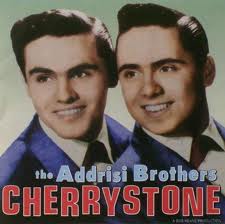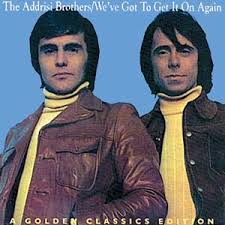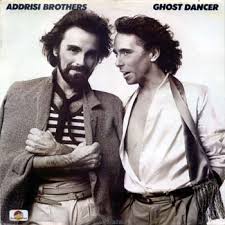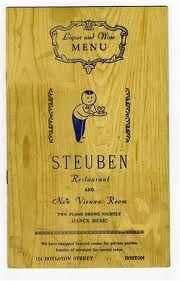“If people tell me they’ve never heard “Never My Love,” I say, ‘That means you’ve never been in an elevator or a supermarket.’ You can’t escape the song. It’s just there.“
March 11, 2002
By phone from his home in Los Angeles
In 2002, a press release from BMI, the performing rights organization that represents songwriters, informed that the ballad “Never My Love” was ranked as the second most played song of the 20th century, behind “You’ve Lost That Lovin’ Feelin’,” and ahead of “Yesterday.” I might have tossed the press release in the wastebasket but for one fact: “Never My Love” was written by Don and Dick Addrisi, two brothers born and raised near Boston. Local boys.
By coincidence, a two-CD set of the Association – “Just the Right Sound: The Association Anthology” – had been released by Rhino Records a few weeks earlier. Naturally it contained the Southern California band’s big hits, the alleged drug song “Along Came Mary,” and the three pop ballads the Association is best known for: “Cherish,” “Windy” and the original version of the much-covered “Never My Love.”
A couple of days later I was talking to Dick Addrisi on the phone.
Tell me about growing up in Massachusetts.
I was born in Winthrop Community Hospital. We lived at 66 Marshall Street. Don was born at Mass. General. We lived in Winthrop until around 1956. My [older by two-and-a-half years] brother Donald, who passed in November of ‘84, died of pancreatic cancer at age of 45. Not good. My dad belonged to the Elks club in Winthrop. They had a lot of shows. My brother was the music man. He was the kind of kid, you give him a ukulele and a week later he could play it without a lesson, he had that kind of God-given talent. My mother brought him to dance classes and the usual thing a five and seven year old goes through.
He got noticed at the Elks club and by some influential people at the yacht club down the street. Things started to happen in his career. He went on the Original Ted Mack Amateur Hour radio show. He must have been 10. For some strange reason I just jumped up onstage during one of the shows at the Elks club, got a couple of laughs and that was all I needed. He was stuck with me as a partner. They started sending me to dance lessons, too.
We started doing shows at the Boston Common. Back in the ‘50s, George Clarke was a big reviewer for the [Boston] Record American [Clarke’s column, “Man About Boston,” actually appeared in the Boston Daily Record; the Record American came into existence in 1961 when the Daily Record merged with the Evening American]. He had a lot of influence. We opened for this comic at Steuben’s Vienna Room. A lot of big acts from Boston played there. It was downstairs on Beacon Street [Addrisi’s memory again is a little off; the actual address of Steuben Restaurant and New Vienna Room was 114 Boylston Street, across from Boston Common]. George Clarke was constantly touting us in the newspaper. Don was around 12, I was 10.
Weren’t you both in your family’s act, the Flying Addrisis?
My parents’ family were acrobats in Europe. Mom and dad didn’t do that, but the name stuck. Deejays would do their thing and call us the Flying Addrisis, the show biz thing in the family. But my father was an engineer for E.D. Badger and Son, a piping engineering company. He also worked on the Esso Arabian oil plant.
In those days everything revolved around the Ted Mack Show, because it was the big variety show on TV. We didn’t win, but George Clarke touted us. In walks another person, Izzy Orts, who owned a nightclub [on Essex Street] called The Golden Nugget. He walked up and said, “Hey, youse guys are good” and he put us in his club. My mom and dad started to think, “Why don’t we go out to the West Coast?” So we took a vacation in 1954 and drove to California.
We started to work at Elks clubs, Shriners clubs. It was a song and dance routine. I played bass fiddle. My folks had Kay make me a half-sized bass, and my brother played ukulele. We were like a young Smothers Brothers. We sang and danced and told a few jokes. My brother even started writing songs.
We did a show at a place called the Masquers Club [in Hollywood]. It was owned by Milton Berle and Red Buttons and some other people [more likely Berle and Buttons were members of the Masquers, a club for actors founded in 1925]. It was a show room where you’d find new entertainment. They had a talent show and we met a lot of people. This guy walks up and says, “I’d like to manage you.” It was Lenny Bruce. He wanted us to play two Italian kids who can only speak Italian but sing in perfect English. He had my brother shave his legs, he was hairy for 15. We stayed for the whole summer to put this act together, we had an Italian teacher. Lenny Bruce gets us an audition with a young agent, Jack Gilardi, and he was married to Annette Funicello and was head of ICM. [Gilardi did not, in fact, marry Annette until 1965]. We did the act. He told us to “go back to Boston and I’ll call you.” And he did, a year later. He said we should come out and audition for this new show Disney was doing, the Mousketeers. This was 1956. My mom and dad put the house up for sale in Winthrop, my dad got a job with a company in California and, boom, we were off and running.
We did the audition and they told my mom and dad, “Look, your [sons’] songs are really professional. What we have in the show are kids who are supposed to know a little about singing and dancing, but not so much that we can’t mold them. They make the other kids look like amateurs.” So we didn’t become Mouseketeers, but we were in this other [Disney] series, “Spin and Marty.” We played Spin and Marty’s friends. And we started playing in Las Vegas, Reno and Lake Tahoe. We opened for Nat Cole and played the lounges with Louis Prima.
We did that for two or three years and then my brother wrote a song called “Cherrystone.” We started doing it in the show. We did it at a club and Bob Keane heard us and signed us to his label, Del-fi records. He brought us to his garage, literally, and we did the 10 songs Don had written and all of a sudden we had a top five record [1959]. That started our record career. [The Beatles’ contemporaries The Searchers covered “Cherry Stone” on their 1963 debut album, “Sugar & Spice.”]
Dick and Bob Sherman [who would go on to write “Mary Poppins,” “The Jungle Book” and many other film scores] came into our life writing songs for us. We got involved in that crowd. Clive Davis heard us and liked us and said, “Hey youse guys are good.” They all said that. We did “[We’ve] Got to Get It On Again” [1972] and had another hit record.
But this was after you wrote “Never My Love,” right?
Right. We went with a small publisher in Hollywood. We got our first recognition for this song, “Where Does Love Go,” a spoken word record with Charles Boyer. Every radio station in the country was playing it. We got nominated for a Grammy and then it got pulled because there was music in the background as a chorus. They said it wasn’t spoken word. This was around 1962 [correct year: 1966]. I was around 21, gee, to be nominated and then lose it. But the best part was getting all this press. It was like the ice skaters at the Olympics [Addrisi was referring to the 2002 Winter Olympics, which ended just two weeks before our interview; American figure skater Sarah Hughes won the gold medal in a startling upset.]
The Association had an open audition at the Troubadour. They walked in off the streets. They sang “Along Comes Mary,” and were signed by the small company we were with, Valiant Records. They went on to have “Cherish” [the B-side of which, “Don’t Blame It On Me,” was written by the Addrisis]. We wrote “Never My Love” for ourselves. Don was thinking of his wife. [Sample lyric: “You ask me if there’ll come a time I grow tired of you? Never my love.”] He came into my room and woke me up at three in the morning. He said, ‘I just asked Jackie to marry me. She asked me if I thought I would ever grow tired of her and I said, “Never, my love.’ Isn’t that a great idea for a song?” I jumped out of bed and we started writing. They did get divorced, but they stayed friends to the point that she was at his deathbed. They were friends from 1962 to 1984. They had two children, Alexis and Amity.
We tried singing “Never My Love” and it sounded like a hula [laughs]. The people from the record company came and said, “I know you want to do this song yourself, but if you want to make a lot of money, sing it for The Association. So we sang it live for The Association in the office. They loved it. Bones Howe, was their producer, and in the track, there was that lick. [Addrisi sings five notes:] Boom boom boom boom boom. That opening of the song has become its signature. People come up and hum it to me all the time.
Ten years after we had a hit with it [via The Association in 1967], it was still going. We were still getting large royalty checks from it. Then the song became a hit again for the 5th Dimension [in 1971]. In the 1972 Olympics [in Munich] the queen of England came out with her horses to “Never My Love.” I can’t tell you how much that paid. It got played everywhere in the world.
There are 300 [cover] versions of “Never My Love.” I’m told the song is played a thousand times a day worldwide. BMI broke it down one time and said if you had a radio station that only played “Never My Love,” it would take them 31 years to play it eight million times. It gets played 1000 times a day worldwide.
[At the time of this interview in 2001, the song had not quite reached eight million plays on the air, though it subsequently passed that mark. In December, 1999, BMI had released a list of “The Top 100 Songs of the Century”; it was calculated that “Never My Love” had received a cumulative 40 years of continuous airplay in the 32 years since it had been written.]
Do you have a favorite version?
The one by The Letterman. They did it a cappella with the most wonderful harmonies. My other favorite version is the one by this group Blue Swede. They had “Hooked On A Feeling.” They cut “Never My Love.” I heard it and I looked at my brother and said, “That’s the worst fucking version ever.” Then it started going up the charts and I started to like it. It hit number one and I said, “That’s the best version I’ve ever heard.”
According to BMI, right now “Never My Love’’ stands as the song with the second most combined radio and television airplay in the U.S. of any song in the 20th century. “You’ve Lost That Lovin’ Feelin’” is number one, and “Yesterday” is number three.
Right. But “Never My Love” is the number one love song, not “You’ve Lost That Lovin’ Feelin’,” which is kind of a downer, it’s not a love song. “You’ve Lost That Lovin’ Feelin’ was in “Top Gun” and got a tremendous amount of play, but we’ll beat them. You know why? I was with McCartney one day. I said, “Hi Paul, it’s Richard Addrisi, “Never My Love.” He said, “Get over here you little fuck, sit down. You beat me, you little fuck.” I said, Paul, why do you think our songs are number one and two, the biggest love songs in the world?” And he said, “Because any bloke can sit down at the piano in the Holiday Inn and play our songs.” Interesting, huh? All you have to do is sit down and sing those songs.
Yet with all the success of your song, you’re still unknown.
We had a chance with the records we had hits with. Some people in the South know us. People in Boston know us. Deejays in Boston always played Addrisi Brothers’ songs. Don and I had a chance to go on the road, we had done it all our lives, we had schlepped around. By the time we had a hit record [in 1972 with “We’ve Got to Get It On Again,” No. 25 Top Forty, No. 10 Adult Contemporary] we both had just gotten married. We made a decision not to go on the road and to stay home and write. This is what I think is the most important thing. Even though people don’t know who Dick and Don Addrisi are, even though they don’t know The Association and the 5th Dimension, one of the last things my brother said to me was, “Y’know Dick, even though the Addrisi Brothers didn’t become a big act, the song lived on.” Groups fade away, but the song lives on. You can’t beat that. If people tell me they’ve never heard “Never My Love,” I say that means you’ve never been in an elevator or a supermarket. You can’t escape the song, it’s just there. We had a wonderful career. I couldn’t ask for more.
Last year [2001] an album of unreleased tapes of yours came out [“Never My Love: The Lost Album Sessions]. How’d the tapes get lost?
I kept on looking at this box with tape I had. I kept looking at the song titles — a lot of them were done on our Columbia album [1972’s “We’ve Got to Get It on Again”]. This “Lost Album” was a chance to rehearse all the songs that ended up on the Columbia album. I had forgotten we’d even done it [in late 1970 for Warner Bros., which never released it]. It ended up in dad’s garage. I had a big bucket and was throwing all this stuff away. I was going to throw it away and for some reason I kept it. Three years later I had it put on a CD. I listened to it and went, “Wow!” Listen to all those vocal parts, it has the best background parts. Harry Nilsson, God bless his soul, did the high parts. We were working at Hollywood Sound Recorders and there was a famous restaurant nearby, Martoni’s, and that’s where everybody hung out, George Harrison, Johnny Mathis, Nilsson. Harry would come over with his fifth of Jack Daniels. He drank himself into oblivion, but boy, did he have talent.
Are you still making music?
I’m involved in writing a Broadway musical. I’ve written five songs so far. The title is “Bernie’s Place. It’s about a booking agent, Bernie Rosenstein, from South Philly. I’m also working with a 16-year-old singer, Jade Russell. We’re recording a CD. She’s going to make me a million dollars. [To date, neither “Bernie’s Place” nor Jade Russell’s CD have seen the light of day.]




